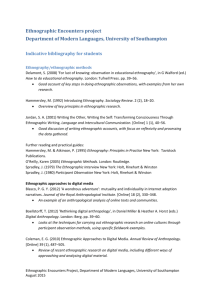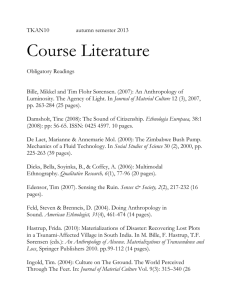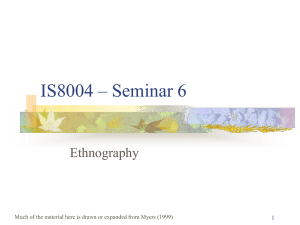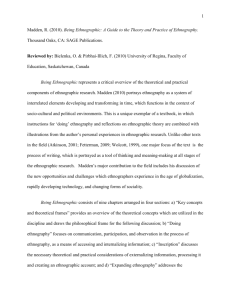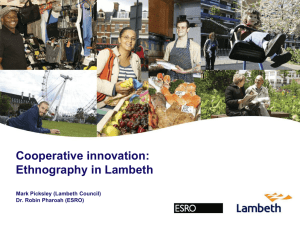24. CULT 318 anthropology and ethnography
advertisement
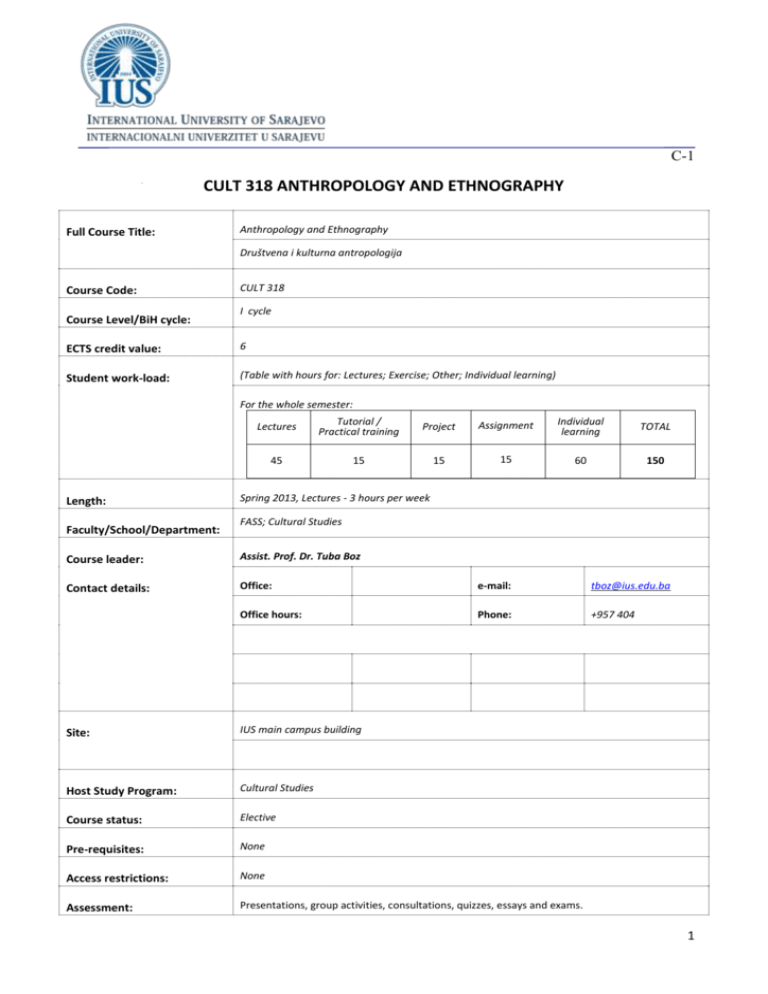
C-1 CULT 318 ANTHROPOLOGY AND ETHNOGRAPHY Full Course Title: Anthropology and Ethnography Društvena i kulturna antropologija Course Code: Course Level/BiH cycle: CULT 318 I cycle ECTS credit value: 6 Student work-load: (Table with hours for: Lectures; Exercise; Other; Individual learning) For the whole semester: Length: Faculty/School/Department: Lectures Tutorial / Practical training Project Assignment Individual learning TOTAL 45 15 15 15 60 150 Spring 2013, Lectures - 3 hours per week FASS; Cultural Studies Course leader: Assist. Prof. Dr. Tuba Boz Contact details: Office: e-mail: tboz@ius.edu.ba Office hours: Phone: +957 404 Site: IUS main campus building Host Study Program: Cultural Studies Course status: Elective Pre-requisites: None Access restrictions: None Assessment: Presentations, group activities, consultations, quizzes, essays and exams. 1 C-1 Date validated: Course aims: Learning outcomes: Indicative syllabus content: The aims of this course are to: 1. to develop a thorough understanding of ethnography as a methodology that is evolving over time; 2. to understand the foundational paradigms, and ethical and methodological considerations that inform ethnography 3. to be able to critically evaluate ethnographic texts 4. to apply ethnographic concepts to better understand contemporary societies On successful completion of this course IUS student will be able to: 1. be fluent in the key concepts and issues used in designing ethnographic fieldwork, and be able to use them properly in their own attempts to marry research questions with doable research work programs. 2. be reflexive and pragmatic about procedures associated with entering the ethnographic field, establishing balanced, useful and effective contacts with gate-keepers, informants and knowledge brokers in the field, and have a sense of how versions of their own identity as researchers are produced and circulated within the community. 3. be familiar with the importance of and techniques used in keeping a detailed and faithful ethnographic diary, annotating it and reading and re-reading it in due course. This course, which is geared for students preparing for a first encounter with ethnographic fieldwork provides an introduction to some of the principal methods for conducting field research in anthropology and in neighboring disciplines. It offers a general preface to what fieldwork is, deals with entry to the field, participant-observation, keeping a field diary and analyzing it, the use of audio-visual materials, and the first stages of constructing texts premised on ethnographic research. Constructed as an interactive process, the course combines more formal lecturing with hands-on field experience on the part of course participants as well as critical reading of inspiring ethnographic accounts. Lectures, discussions, group and individual project work. Learning delivery: Assessment Rationale: Assessment Weighting: Essential Reading: Recommended readings: Attendance + active participation in class, based on reading of the course materials and discussion of ongoing fieldwork and exercises (10%). An ethnographic project in Sarajevo designed and carried out in teams of two or three, comprising of the following elements: 1. A written ethnographic account of up to 3,000 words, co-authored jointly by the team (40% of course grade) 2. Presentation in class by the team of their work in progress (20% of course grade) 3. Individual ethnographic diary with weekly field entries (30% of course grade) Attendance and Participation: 10% Ethnographic project: 40% Presentation in class: 20% Individual diary: 30% Additional/recommended reading: See course schedule for detailed list of mandatory readings. Essential reading consist of collection of journal articles and book chapters that will be delivered to the students in electronic form (either by e-learning site, e-mail or Drop Box). 1. Hammersley and Atkinson, Ethnography: Principles and Practice. London: Routledge Intranet web reference: Important notes: Students have to make sure to avoid plagiarism or even the vague possibility of plagiarism. Note that copying from the internet or even taking ideas from internet sources without proper citation is also a form of plagiarism, not only copying from paper based texts. Students are expected to paraphrase the arguments whenever possible and add proper citations from the original text. Each final essay will be checked against anti-plagiarism software. Failing to gain at least 30% from each assignment results in failing the course (that is students are expected to undergo each of the four assignment forms (class participation, mid-term exam, final essay). 2 C-1 Absence from class is allowed only with strong reason. Students are allowed two “free misses” but more than two absences without documentation/prior information will negatively affect the grade. Similarly, classroom policy strictly requires of students respectful behaviour towards the co-students. Failing in showing respect and attention to other students’ contribution may result in lowering the participation grade. Language policy: lack of sophistication in written/spoken English will not result in lower grading as long as the arguments made by the student are understandable. Emphasis will be made on structure of the argument/paper/presentation, logical flow and originality of contribution. Quality Assurance: Students will be provided written feedback for each of the assignments. Students unsatisfied with the assessment of their written work (position paper and final essay) will have a chance to rewrite them and submit for second examination provided they met the deadlines. Students, who wish to increase the part of the grade coming from in-class participation, may be given additional tasks. Students are encouraged to consult their work in progress with the course leader during the office hours or through e-mail communication. Course schedule: 3 C-1 Week 1 Lesson / Date 1 Topics to be covered Class activities Problems/ Assignments (Homework) Readings Introduction to the course’s aims Course syllabus will be presented, its aims and objectives; getting to know and objectives explained and any questions each other students have regarding the course will be answered. 1. Identify the main aims and objectives of the course. 2. Explain how the course can be useful for their academic career. Students will be asked to present their motivation for taking the course as well as their academic background/interests so that the applicability/usefulness of the course can be assessed. 1 2 Introducing ethnography Historical beginnings of ethnography will be presented. Difference between ethnography and other research methods will be explained. 2 3 Inspiring reading: ethnographic Discussion of the assigned reading will be account of medical anthropology facilitated focusing both on the topic presented and the ethnographic workshop/style. Learning objectives (After this lesson student will be able to:) Salzman, Philip.1994. The Lone Stranger in the Heart of Darkness. In: Borofski, Robert (ed.) Assessing Cultural Anthropology. Cambridge, Mass: MacGraw and Hill pp 29-39 Wagner, Sara. 2006. To Know Where He Lies. DNA Technology and the Search 1. Describe historical beginnings of ethnography 2. Explain the difference between ethnography and other research methods 1. Critically asses ethnographic writing 2. Apply ideas/writing style to their own projects 4 C-1 for Srebrenica’s Missing (selected chapter) 2 4 Site, place, location in ethnography What is site and place in ethnography? Is it bounded? How to decided where it begins and where it ends? Students will be encouraged to think critically about these questions. 3 5 Research structure: can participant observation be designed? Discussing limits of research structure and design- how much can be realistically planned? Gupta, Akhil and James Ferguson. 1997. Discipline and Practice: "The Field” as Site, Method, and Location in Anthropology. In A. Gupta and J. Ferguson eds. Anthropological Locations Berkeley: University of California Press Pp: 1-46. 1. Describe site and place in ethnography Hammesrley, 1. Explain the limits of Martyn and Paul research design Atkinson. 1983. Research Design: problems, cases and samples. In: Hammersley and Atkinson, Ethnography: Principles and Practice. London: Routledge. Pp. 5 C-1 23-53/ 3 6 Participant observation What is participant observation? 4 7 Inspiring reading: political ethnography Discussion of the assigned reading will be facilitated focusing both on the topic presented and the ethnographic workshop/style. 4 8 Presentation of ideas for group project 5 9 Entering the field How to get started? Establishing one’s presence in the field will be analysed. Divide into groups (of twothree) and brainstorm ideas for group project Bernard, R. 1995. 1. Explain what participant Participant observation is Observation. Ch. 7 In Research Methods in Anthropology. Qualitative and Quantitative Approaches. Walnut Creek, Cal. : AltaMira Press. Pp. 136164. 1. Critically asses ethnographic writing 2. Apply ideas/writing style to their own projects Stephen Schensul et al. 1999. Entering the Field. In Schensul, S et al Essential Ethnographic Methods. Walnut Creek: Altamira Press. 1. Prepare for entering the field 6 C-1 5 10 Field notes What are field notes and how to write them? Different strategies for writing field notes will be presented and discussed. 6 11 Inspiring reading: field notes Discussion of the assigned reading will be facilitated focusing both on the topic presented and the ethnographic workshop/style. 6 12 The Ethnographic Interview What is informed Consent/interview Agreement, how can it be created and why it is important? What are the strategies for successful listening in ethnographich research? 7 13 Inspiring reading: interviewing Discussion of the assigned reading will be facilitated focusing both on the topic presented and the ethnographic workshop/style. Sanjek, Roger. 1990. A Vocabulary for Field Notes. Pp 92-121 in Sanjek, Roger (ed.) Fieldnotes. 1. Write ethnographic field notes Chapter from Rabinow, Paul Reflection on Fieldnotes from Marocco 1. Critically asses ethnographic writing 2. Apply ideas/writing style to their own projects Briggs, Charles. 1983. Learning How to Ask. Cambridge: Cambridge University Press. Chapter 5' Listen before you leap: toward methodological sophistication.' Pp 93-111. Harding, S. 1987. Convicted by the Holy Spirit: The Rhetoric of Fundamental Baptist Conversion. 1. Know how to write informed consent agreement and understand its importance 2. Know how to listen well during an interview 1. Critically asses ethnographic writing 2. Apply ideas/writing style to their own projects 7 C-1 American ethnologist 14:167-181. 7 14 Practicing interviewing 8 15 Presentation of group project designs 8 16 Structured comparisons and ethnographic surveys Structured comparisons and ethnographic surveys will be presented and explained 9 17 Visual methods and analysis Watching Visual Ethnography- Current Theory 1. Conduct ethnographic interview Students will practice interviewing during in-class role play http://www.youtube.com/watch?v=gDPjzz7LfU Stephen Schensul et al. 1999. Structured ethnographic data collection. In Schensul, S et al Essential Ethnographic Methods. Walnut Creek: Altamira Press. 1. Describe structured comparisons and ethnographic surveys Banks, M. 2001. Visual methods in social research. London: Sage. (Chapters 4 and 5. ‘Research Strategies’ and ‘Making images’, pp. 73-137) 1. Describe different visual methods in ethnography 8 C-1 9 18 Inspiring reading: ethnography of nationalism Discussion of the assigned reading will be facilitated focusing both on the topic presented and the ethnographic workshop/style. 10 19 Analysing data Process of data analysis will be explained 10 20 Analysing data- exercises Individual and group exercises of ethnographic data analysis 11 21 Ethnographic writing What is specific to ethnographic writing? What is ethnographic style and argument? How to write well? Students will be encouraged to discuss those issues and analysed sample writing in their light. Rogers Brubaker 2006, Nationalist politics and everyday ethnicity in a Transylvanian town 1. Critically asses ethnographic writing 2. Apply ideas/writing style to their own projects Hammersley, Martyn and Paul Atkinson. 1983. The Process of Analysis. In: Hammersley and Atkinson, Ethnography: Principles and Practice. London: Routledge. 1.Understand how data analysis is conducted 1. Know how to analyse ethnographic data Gay y Blasco, P., and H. Wardle. 2006. Ethnography as argument. In How to read ethnography. Abingdon [England]; New York: Routledge. Pp. 96-116 1. Explain what ethnographic argument is 2. Identify particular elements and characteristic of ethnographic writing 9 C-1 11 22 Ethnographic authorship What is authorship in ethnography? Should it be shared with informants? How to acknowledge and incorporate their input? 12 23 Inspiring writing Discussion of the assigned reading will be facilitated focusing both on the topic presented and the ethnographic workshop/style. 12 24 Ethical challenges Ethical issues related to conducting research will be discussed. Problems of protecting informants’ identity/anonymity will be analyzed. Rabinowitz, Dan. 1997. Reflexivity and Liberalism. Ch. 6 in Rabinowitz, D. Overlooking Nazareth: The Ethnography of Exclusion in Galilee. Cambridge: Cambridge University Press 1. Critically asses debates about ethnographic authorship Abu-Lughod, Lila. 1985. Honor and the sentiments of loss in a Bedouin society. American Ethnologist Vol 12 no 2. 1. Critically asses ethnographic writing 2. Apply ideas/writing style to their own projects Hammersley, Martyn and Paul Atkinson. 1983. Ethics. In: Hammersley and Atkinson, Ethnography: Principles and Practice. London: Routledge. 1. Describe variety of ethical challenges in ethnographic research and potential solutions to them. 2. Understand the notion of reflexivity in ethnographic writing 2. Know how to protect informants’ identity/anonymity in the process of writing. 10 C-1 13 25 Native anthropologists? Concept of ‘native anthropologist’ will be presented and discussed. Students will be encouraged to reflect on their own positionality and possibilities to apply anthropological approaches in their academic work. 13 26 Ethnography in globalizing world Concept of globalization will be explored and historicized. Methodological challenges for anthropological work in the era of globalization will be discussed (including multi-sited ethnography, extended case method). Kirin Narayan, How Native Is a "Native" Anthropologist? 1. Reflect on their own positionality as researchers Appadurai, Arjun. 1996. Disjuncture and Difference in the Global Cultural Economy. In Modernity at Large: Cultural Dimensions of Globalization 1. Explain the concept of globalization and its implications for anthropology. 2. Understand difference between multi-sited ethnography and extended case method. 3. Describe the changing notion of place and site in anthropology. 14 27 Inspiring reading Discussion of the assigned reading will be facilitated focusing both on the topic presented and the ethnographic workshop/style. Nancy ScheperHughes, “The Global Traffic in Human Organs,” in The Anthropology of Globalization Reader, pp. 270308. 1. Critically asses ethnographic writing 2. Apply ideas/writing style to their own projects 11 C-1 14 28 Presentation of the final projects 15 29 Presentation of the final projects 15 30 Summary and course evaluation Review of main concepts and theories Final essay 12
